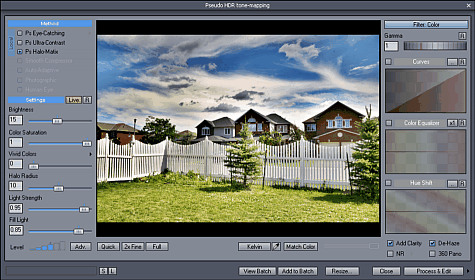Why not to have fun with the software? After all that serious capturing, aligning and tone-mapping, here is a fun, single image solution that can be applied to almost any file. Of course the results will vary... but it takes only fraction of the full HDR processing time and no special preparation.
If you use only single source file in the Adding Images and you choose the Pseudo HDR process, your tone mapping dialog will appear as below with only two available methods.

It is important to remember that Pseudo HDR process does not tone-map a real HDR file, it simulate the look of a tone-mapped image on a single 8-bit source. It is a Pseudo HDR Tone-Mapping. The result can be sometimes very good, other time it may create a noisy image... it all depends on how well exposed is the single source image.
Note: Due to the nature of this 8-bit process, the preview will look more contrasty (and more rough) than the full-size processed 8-bit image. The full-size usually looks better. You can use 2x Fine preview which is in this case faster than when working with full HDR file.
It is usually better to use slightly underexposed image, especially if a sky takes a large part on our image. However too much under-exposure will intensify noise.
Portraits are usually pretty bad source for HDR image and even worst if we take just one shot and use Pseudo HDR.
The full processed image may, in some cases look as if really processed from multiple images, especially if you use higher Dramatic Light settings. However because we are working with limited dynamic range expect to have over-exposed and/or under-exposed areas on your picture and also increased noise in these areas.